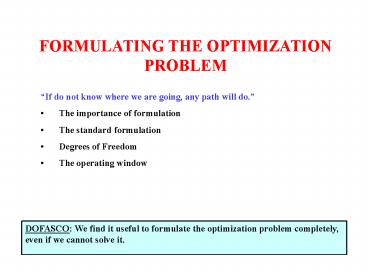FORMULATING THE OPTIMIZATION PROBLEM PowerPoint PPT Presentation
1 / 24
Title: FORMULATING THE OPTIMIZATION PROBLEM
1
FORMULATING THE OPTIMIZATION PROBLEM
- If do not know where we are going, any path will
do. - The importance of formulation
- The standard formulation
- Degrees of Freedom
- The operating window
DOFASCO We find it useful to formulate the
optimization problem completely, even if we
cannot solve it.
2
FORMULATING THE OPTIMIZATION PROBLEM
While walking home after the first Chem. Eng.
4G03 class, you began to worry about passing the
course.
Fortunately, you notice a magic lantern, which
you rub. A Genie appears and grants you ONE
wish. You wish for the highest grade in 4G03.
What happens?
3
What did the Genie do to grant your wish?
Your classmates
you
Oh no! The Genie tricks the class, minus you,
into a bus that runs over a cliff. Everyone in
the bus perishes but you receive the highest
grade in 4G03. You are very mad at the Genie, but
he says that he only did what you asked.
4
FORMULATING THE OPTIMIZATION PROBLEM
- LESSONS LEARNED
- The Genie gave you what you asked for - not what
you intended. - An Optimizer is like the Genie. Therefore, we
must formulate the problem carefully and check
the results for surprises! - If we maximize profit, can we
- - pollute the environment?
- - endanger workers?
- - produce products that are shabby or dangerous?
- - design a plant that only functions for six
months?
5
FORMULATING THE OPTIMIZATION PROBLEM
This is the general formulation that we will be
using throughout the course
Objective function Equality constraints Inequali
ty constraints Variable Bounds
6
FORMULATING THE OPTIMIZATION PROBLEM
7
FORMULATING THE OPTIMIZATION PROBLEM
- Some comments on the objective function
- A scalar is preferred for solving. However,
multiple objectives are typical in real life. - Note that Max (P) is the same as Min (-P)
- Sometimes we use a simple, physical variable,
such as yield of a key product. This assumes
that max (profit) is the same as Max(yield),
which might not always be true.
8
FORMULATING THE OPTIMIZATION PROBLEM
- Some comments on the objective function
(continued) - We have difficulty when the models are
inaccurate, for example, the tradeoff between
current reactor operation and long-term catalyst
activity. - Modelling the market response to improved product
quality, etc is difficult. - We want a smooth function.
9
FORMULATING THE OPTIMIZATION PROBLEM
10
FORMULATING THE OPTIMIZATION PROBLEM
- Some comments on equality constraints
- The key balances must be strictly observed. If
we do not ensure that they are closed, the
optimizer will find a way to create mass and
energy! - The models may change. For example, a heat
exchanger could have either one or two phases,
with the number of phases depending on the
optimization decisions.
11
FORMULATING THE OPTIMIZATION PROBLEM
12
FORMULATING THE OPTIMIZATION PROBLEM
13
FORMULATING THE OPTIMIZATION PROBLEM
- Some comments on variables
- Many variables are continuous, but some are
discrete or integer. Give some examples of each. - Typically, we do not define the decision
variables. Since we solve a set of simultaneous
equations, are variables are determined together. - We should always place bounds on variables. Why?
14
FORMULATING THE OPTIMIZATION PROBLEM
When modelling, we always encounter the issue of
Degrees of Freedom (DOF). How do we determine
the ODF for an optimization problem using the
relationship below? DOF ( variables) - (
equations) variables equations
15
FORMULATING THE OPTIMIZATION PROBLEM
In 3G03 and 3P03, we required the models to have
DOF0. Why? For optimization, what value(s) do
we expect for the DOF?
The answer explains why optimization is so widely
applied!
16
FORMULATING THE OPTIMIZATION PROBLEM
Often, we will think of the problem as having
Opt Var var - equality constr. We can plot
this if only two dimensions.
What about points inside? Which is the best?
feasible region
Opt Var2
Opt Var1
17
FORMULATING THE OPTIMIZATION PROBLEM
We can plot values of the objective function as
contours. Where is the optimum for the two cases
shown below?
Opt Var2
Opt Var2
Opt Var1
Opt Var1
Case A
Case B
18
FORMULATING THE OPTIMIZATION PROBLEM
Variables and objective function can be plotted
in 3D
T
FA
19
FORMULATING THE OPTIMIZATION PROBLEM
How do we select the appropriate system for a
specific problem?
20
FORMULATING THE OPTIMIZATION PROBLEM
How do we select the appropriate system for a
specific problem?
Marlins Rule 1 We must consult people with a
broader responsibility/knowledge than system S
to determine the true objectives of system S.
21
FORMULATING THE OPTIMIZATION PROBLEM
- How do we define a scalar that represents
performance, including - Economics
- Safety
- Product quality
- Product rates (contracts!)
- Flexibility
- ...
22
FORMULATING THE OPTIMIZATION PROBLEM
- How accurately must we model the physical
process? - Macroscopic
- 1,2 3, spatial dimensions
- Steady-state or dynamic
- Physical properties
- Rate models (U(f), k0e-E/RT, ..
23
FORMULATING THE OPTIMIZATION PROBLEM
- What limits the possible solutions to the
problem? - Safety
- Product quality
- Equipment damage (long term)
- Equipment operation
- Legal/ethical considerations
24
FORMULATING THE OPTIMIZATION PROBLEM
No one solution or approach is suitable for
optimization!

